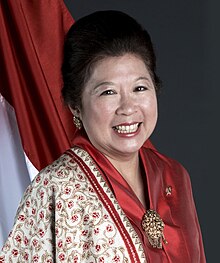Mari Elka Pangestu
| Mari Elka Pangestu 馮慧蘭 |
|
|---|---|
 |
|
| Minister of Tourism and Creative Economy | |
|
In office 19 October 2011 – 20 October 2014 |
|
| President | Susilo Bambang Yudhoyono |
| Preceded by | Jero Wacik |
| Succeeded by | Arief Yahya |
| Minister of Trade | |
|
In office 21 October 2004 – 19 October 2011 |
|
| President | Susilo Bambang Yudhoyono |
| Preceded by | Rini Mariani Soemarno Soewandi |
| Succeeded by | Gita Wirjawan |
| Minister of Cooperatives and Small & Medium Enterprises ad-interim |
|
|
In office 1 October 2008 – 22 October 2009 |
|
| President | Susilo Bambang Yudhoyono |
| Preceded by | Suryadharma Ali |
| Succeeded by | Syarief Hasan |
| Personal details | |
| Born |
Phang Hoei Lan 23 October 1956 Djakarta, Indonesia |
| Nationality | Indonesian |
| Spouse(s) | Adi Harsono |
| Children | Raymond Arya |
| Alma mater |
Australian National University University of California, Davis |
| Religion | Roman Catholicism |
Mari Elka Pangestu (traditional Chinese: ; simplified Chinese: ; pinyin: Féng Huìlán; Pe̍h-ōe-jī: Phang Hoei Lan; born 23 October 1956) was the Minister of Trade of Indonesia from October 2004 to October 2011. In a cabinet reshuffle in October 2011 she was appointed to the newly created position of minister of Tourism and Creative Economy, a post she held until the term of the administration of president Susilo Bambang Yudhoyono finished on 20 October 2014.
In late December 2012 the Indonesian Government nominated Mari Pangestu as a candidate for the position of Director-General of the World Trade Organization (WTO) to succeed the incumbent Director-General, Pascal Lamy, whose term ends in 2013. The General Council of the WTO considered nominations from various countries in early 2013. The selection process went through various rounds and in late April 2013 eliminated all three candidates from the Asia-Pacific region. Mari Pangestu issued a gracious statement accepting the outcome of the process.
Mari Pangestu is the first female Chinese Indonesian to hold a cabinet position in Indonesia. After her appointment to the new cabinet position of Tourism and Creative Economy she spent time explaining the approach of the government towards fostering creative sectors of the economy in a number of statements.
The initial listing of the 14 sub-sectors included in the scope of the creative economy part of the Ministry was the following:
Tourism
When focusing on tourism priorities within her portfolio she was both supportive of plans to develop the tourist sector but also pointed some well-known problems. She noted, for example, that problems of hygiene, security, and poor infrastructure constitute handicaps for the industry in Indonesia. She discussed the need for a strategy to develop the tourist sector. She also emphasised that a range of challenges would need to be tackled in promoting the sector in Indonesia and that some of the challenges would take time to overcome. Other steps she announced with the aim of promoting tourism included an emphasis on sports tourism, with priority to be given to the promotion of golf in the short-term and increasing attention to other activities such as yachting over the longer-term.
...
Wikipedia
